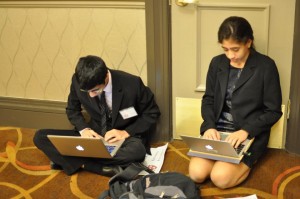Currently, there is a great schism in the debate on this topic, as countless conferences have prohibited the use of electronics during committee; however, many others openly encourage their use in the committee room, believing that they allow for better debate. We’ve tried to break this dilemma down into its pros and cons:
Pros of allowing electronics-
1. Electronic Devices Expedite the Drafting of Resolutions:
With the use of laptops, along with other electronic devices, delegates can type up resolutions faster than they would be able to by hand. Additionally, through the use of document sharing programs such as Google Drive (along with dozens of other programs) delegates in a bloc can collaborate in real-time when writing a resolution, and all type up one document simultaneously. Electronics also allow for delegates to send Working Papers/Draft Resolutions to their chairs quicker and prevents the chair from having to retype documents, thus allowing the chair to focus more on debate.
2 Electronics Have the Potential to Promote Diplomacy:
Seeing as not all delegates will have laptops or tablets with them, members of a bloc will need to share these items with the members of their bloc. This is a great way to promote diplomacy between delegates, as they will have to cooperate with limited resources to complete their resolution. Being able to work together diplomatically while using such technologies will encourage more collaboration between delegates in committee.
3. Electronics May Allow for a Higher Level of Debate:
Electronics with internet access have the potential to greatly enrich the debate that occurs in committee. Delegates would have the ability to research facts on the spot in committee and make sure that they are staying on policy whenever they propose a point in a speech. This could allow for much more factually correct and informative committee sessions, which would make Model UN even more of a learning experience.
Cons of Allowing Electronics-
1. Electronics Can Create Discrepancies in Resolution Writing:
By introducing electronics into conferences, it may become harder to distinguish if a delegate has pre-written their resolution, an action that will often result in disqualification from awards. Additionally, electronics could make it easier for students to plagiarize directly from information they look up on the internet. Also, increased electronics use will give a disproportionate amount of authority to the few delegates that have the resolution saved on their laptop or tablet.
2. Not Every Delegate Will Have Electronics:
Because not every delegate will be able to bring these electronics into committee, those who are able to bring them in will have an advantage right from the get-go. It shouldn’t be fair to increase a delegate’s chances of winning based on whether they can afford such technologies, as opposed to their speaking and debating capabilities.
3. Electronics May Encourage Delegates to Do Less Research Before the Conference:
If delegates with electronics know that they will be able to look up anything they need to know in the middle of committee, where is the incentive for them to do any extra preparation in the weeks leading up to the conference? Electronic use may inadvertently reduce the amount of research delegates do, detracting from Model UN as a whole.
There are many different opinions on the matter. While some conferences are steadfast in their decisions to bar the use of electronics, many others are beginning to open up to the idea of allowing their use. This debate is sure to be present in the future years to come in Model UN, and hopefully a compromise between the two schools of thought will be reached.
Have an opinion on how conferences should deal with this problem? Leave a comment below on what role you believe electronics should play in committee.




